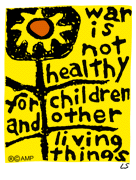Christopher Columbus: Nobody's Hero
My son brought home a hat, made of construction paper, from school on Friday. He told me that it was his Christopher Columbus hat. He also told me he had learned that Christopher Columbus was an explorer of some lands (kind of like Dora) and he went to an island and met some people he had never seen before.
Not bad for a 4-year-old.
And since he's only four years old, I decided that it was not appropriate to share my views on Christopher Columbus, no matter how much I wanted to because I was cringing every time he said something good about the man - a man I don't feel should be celebrated at all and I really don't agree with presenting him as a hero to our children when he is responsible for the slaughter and enslavement of thousands of native people he found on the lands he "discovered."
I first learned a different story regarding Christopher Columbus when I read Howard Zinn's "A People's History of the United States," in college. To read this book was, and still is, a mind blowing experience. Zinn writes a history revolving around those who were oppressed, murdered and enslaved by the so called victors of history we usually hear about in school. History from this vantage point is in complete contradiction with the U.S. History I was raised on and at many points in the book it's almost too much to wrap my brain around - it's that overwhelmingly eye opening.
OK, so enough of my 1,001st endorsement of A People's History . . .
Zinn opens up his history book with a chapter entitled "Columbus, the Indians, and Human Progress" and in it he uses quotes from Columbus' own diaries and the words of Bartolome de las Casas, a priest who accompanied Columbus on his journey who participated in the conquest of Cuba, but and then turned against the Spaniards when he could watch the cruelty perpetrated on the natives no longer.
It is in these first hand accounts that the most surprisingly cruel information is found - the details are horrific and yet Columbus records his actions with great arrogance and expects to be hailed a hero upon his return to Spain. Mainly because he believes he has found a previously unknown land just off the coast of China where he expects to find all kinds of gold and interesting spices. Of course, we all know that Columbus found the Caribbean Islands, Cuba, the Dominican Republic and Haiti - islands not known for gold then or now.
Upon his arrival in the Bahamas, Columbus was greeted by the Arawak Indians who offered many gifts to the visitors, while Columbus would later write in his journal, "They would make fine servants. . . . With fifty men we could subjugate them all and make them do whatever we want."
You see, things haven't changed much since 1492. Columbus was sent across the Atlantic for monetary reasons and it took quite a lot of money to fund the trip; Therefore he was under great obligation to bring back to the King and Queen of Spain a large amount of riches which, when he didn't find very much gold, included people (Arawaks) to be used as slaves. And Columbus wasn't just out to satisfy his rulers back home - as an incentive Columbus was promised 10 percent of the profits from whatever he brought back, a governorship over the new lands and fame from being named "Admiral of the Ocean Sea."
So Columbus tried to force the Arawaks to tell him where the gold was - there wasn't any, so he took hundreds of them prisoner and forced them into slavery (those that made it through the voyage across the sea that is) and he killed countless more trying to scare the location of the gold out of the others. Oh and let's not forget the forced labor in the mines that were established in pursuit of gold where women and children were overworked and died, while families were murdered for not making their quotas from week to week. The result of such savagery, from a man who was supposedly a representative of the "civilized" world was:
"In two years (of Columbus' arrival) , through murder, mutilation, or suicide, half of the 250,000 Indians on Haiti were dead. . . . By the year 1515, there were perhaps fifty thousand Indians left (in Haiti). By 1550, there were five hundred. A report of the year 1650 shows none of the original Arawaks or their descendants left on the island."
That's just the beginning of the legacy of Christopher Columbus. I can't go on any longer or I'll just get (more) worked up. If you can stomach more information, Google it or check out Zinn's book, whatever you feel you need to do to know the truth.
I'm all for a day off from work; Americans especially work too many hours and too many days a year. But while your enjoying your holiday, take the time out to educate yourself with a little history lesson.
Only through knowledge can we change our own lives and the lives of others.


















1 Comments:
okay okay... i'm officially putting his book on reserve at the library. i wonder what he says about that fucker paul revere!
Post a Comment
<< Home